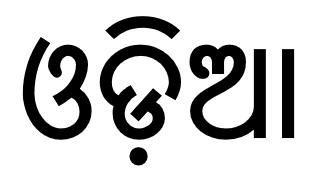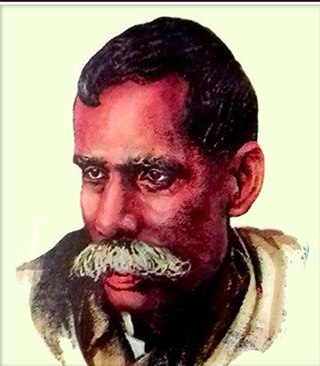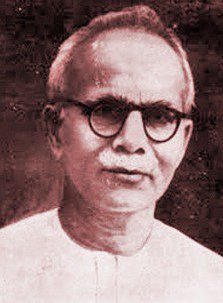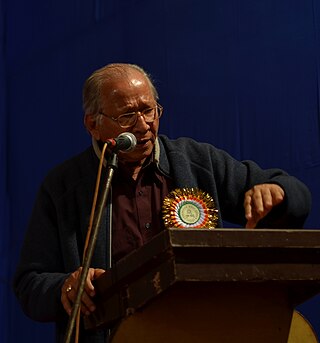
Odia is a classical Indo-Aryan language spoken in the Indian state of Odisha. It is the official language in Odisha, where native speakers make up 82% of the population, and it is also spoken in parts of West Bengal, Jharkhand, Andhra Pradesh and Chhattisgarh. Odia is one of the many official languages of India; it is the official language of Odisha and the second official language of Jharkhand. The Odia language has various dialects varieties, including the Baleswari Odia, Kataki, Ganjami Odia, Sundargadi Odia, Sambalpuri, Desia and Tribal Community dialects who spoken by the tribals groups in Odisha who adopted the Odia language.

Sant Tukaram Maharaj, also known as Tuka, Tukobaraya, Tukoba, was a Hindu, Marathi Saint of Varkari sampradaya" in Dehu village, Maharashtra in the 17th century. He was a bhakt of the god Vithoba, also known as Vitthal, of Pandharpur. He is best known for his devotional poetry called Abhanga, which are popular in Maharashtra, many of his poems deal with social reform. His poems are included in the school and college syllabuses prominently in the state of Maharashtra.

Jayanta Mahapatra was an Indian poet. He is the first Indian poet to win a Sahitya Akademi award for English poetry. He was the author of poems such as "Indian Summer" and "Hunger", which are regarded as classics in modern Indian English literature. He was awarded a Padma Shri, the fourth highest civilian honour in India in 2009, but he returned the award in 2015 to protest against rising intolerance in India.
Indian English poetry is the oldest form of Indian English literature. Henry Louis Vivian Derozio is considered the first poet in the lineage of Indian English poetry followed by Rabindranath Tagore, Sri Aurobindo, Sarojini Naidu, Michael Madhusudan Dutt, and Toru Dutt, among others.
Odia literature is literature written in the Odia language, mostly from the Indian state of Odisha. The modern Odia language is mostly formed from Tadbhava words with significant Sanskrit (Tatsama) influences, along with loanwords from Desaja, English, Hindustani (Hindi/Urdu), Persian, and Arabic. Its earliest written texts date from around 1000 CE. The earliest Odia newspaper was Utkala Deepika, first published on August 4, 1866.

Radhanath Ray was an Odia writer of initial modernity era in Odia poetry during the later part of nineteenth century. He was born in a Zamindar Karan family in Baleshwar, now in Odisha, and is honoured in Odia literature with the title Kabibara . In his early life, he composed in both Odia and Bengali languages, but later he shifted his writings in Odia only. He was born on 28 September 1848, at Kedarpur village in Baleswar district, Odisha. He has contributed verses and poetry for Odia literature in the nineteenth century.

Tapan Kumar Pradhan is an Indian poet, writer and translator from Odisha. He is best known for his poem collection "Kalahandi" which was awarded second place in Sahitya Akademi's Golden Jubilee Indian Literature Translation Prize for Poetry in 2007. His other works include "Equation", "I, She and the Sea", "Wind in the Afternoon" and "Dance of Shiva".

Gopinath Mohanty (1914–1991), winner of the Jnanpith award, and the first winner of the National Sahitya Akademi Award in 1955 – for his novel, Amrutara Santana – was a prolific Odia writer of the mid-twentieth century. Satya Prakash Mohanty, professor of English, Cornell University says: "In my opinion, Gopinath Mohanty is the most important Indian novelist in the second half of the twentieth century."

Sitakant Mahapatra is an Indian poet and literary critic in Odia as well as English. He served in the Indian Administrative Service (IAS) from 1961 until he retired in 1995, and has held ex officio posts such as the Chairman of National Book Trust, New Delhi since then.
Nanda Kishore Bal, was an Indian poet of the era of initial modernity in Odia poetry. He was born at Kusupur village in the Cuttack district of Odisha. He was initially named as Rasananda Jena. Later he was adopted by her aunt and then came the name Nanda Kishore Bal. He is popularly known as "Palli Kabi" for his tender lyrics, celebrating the beauty of rural Odisha in his poems.
Pratibha Satpathy is a poet of Odia literature. She has been recognised as one of the leading poets of the country and has been honoured with the Sahitya Akademi Award.

Pandit Godabarish Mishra was a poet and notable socialist from Odisha, India. He is known for his contribution to Odia literature.

Jagannath Prasad Das is an Indian writer, poet, painter, playwright and novelist who writes in Odia.

Mayadhar Mansingh was an Indian poet and writer who wrote in Odia. He received the Padma Shri, the fourth-highest civilian award in India, in 1967.

Santanu Kumar Acharya is a Sahitya Akademi Award-winning Indian writer.
Radha Mohan Gadanayak (1911–2000) was an Indian poet of Odia literature, known for his ballads and poetic creations. The poet, considered by many as one of the major Odia poets of this century, was a recipient of the Sahitya Akademi Award, which he received, in 1975, for his poem anthology, Surya O Andhakar. The Government of India awarded him the fourth highest civilian award of Padma Shri in 1990.
Basanta Kumari Patnaik was an Odia language novelist, short story writer, playwright, poet and essayist; considered to be one of the pioneers in Odia literature. She became famous for her three novels: Amada Bata, Chorabali and Alibha Chita, among which Amada Bata has been adapted into an Odia film by same name.

Hussain Rabi Gandhi was an Indian Odia writer of the late-twentieth century, a politician, a public intellectual and a cultural activist hailing from the Indian state of Odisha. Being a founder member of Biju Janata Dal, he served as the general secretary of the party from upon its formation in 1998 till 2005. In 1994 the title of Biplabi Loka Kabi was conferred upon him by the Mayor of Cuttack. He was also awarded with the title of Utkala Jyoti in 1996 by the then Deputy chief minister of Odisha, Basant Kumar Biswal on the behalf of Freedom Fighter's Organisation. Gandhi primarily wrote in Odia language and was bestowed with the Secular India Harmony Award in 1993 by the former President of India, Giani Zail Singh and with the Gangadhar Meher Kabita award in 2015 for his notable contributions to the field of Odia poetry. Hussain served as the President of Odisha Sahitya Akademi (2008–2010). He was famously known as the Gandhi of Korei and was regarded as a bridge between Western Odisha and Coastal Odisha. He also served as Lead Member of Smt. Nandini Satpathy Memorial Trust (SNSMT).

Utkal Sahitya Samaj is a literary organization located in Cuttack, Odisha, India, founded in 1903. The organization is aimed to the debate on Odia literature and to develop people's interest in Odia language.

Saroj Bal is a Odia language poet from India. He is also a translator and editor of several literary journals.














